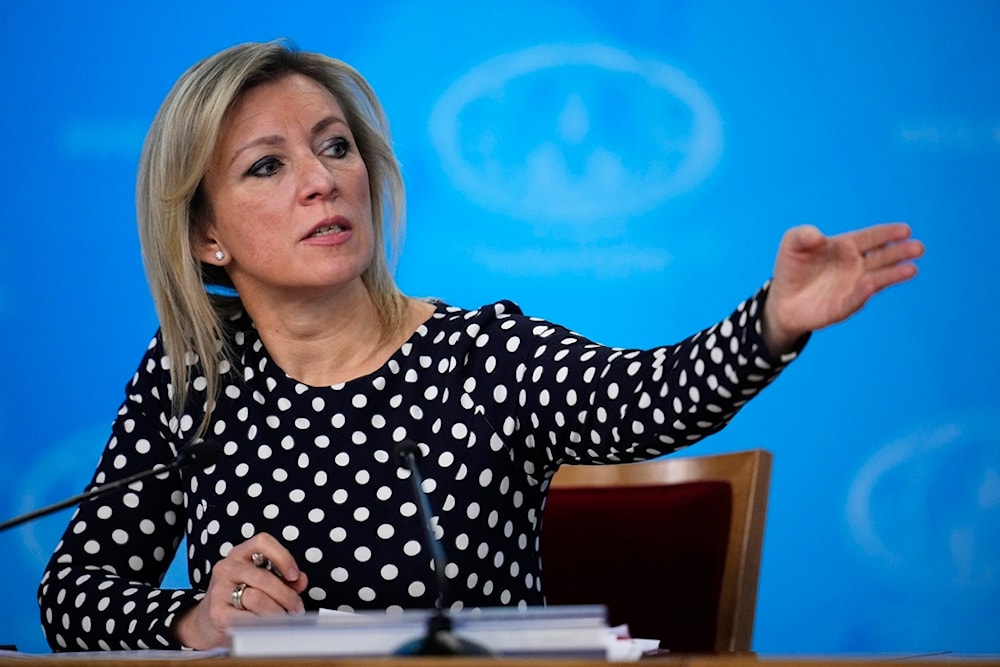Zakharova: 'Israel' unwilling to acknowledge neo-Nazism in Ukraine
Russia accuses "Israel" of either ignorance or deliberate refusal to acknowledge neo-Nazism in Ukraine.
-
 Russian Foreign Ministry spokeswoman Maria Zakharova gestures during Russian Foreign Minister Sergey Lavrov's annual news conference in Moscow, Russia, Thursday, Jan. 18, 2024 (AP)
Russian Foreign Ministry spokeswoman Maria Zakharova gestures during Russian Foreign Minister Sergey Lavrov's annual news conference in Moscow, Russia, Thursday, Jan. 18, 2024 (AP)
The removal of Izvestia correspondent Nikita Klyukhin from Israeli Foreign Ministry press conferences following his question about the glorification of Stepan Bandera in Ukraine highlights either "Israel’s" ignorance or its unwillingness to acknowledge the truth about neo-Nazism in Ukraine, Russian Foreign Ministry spokesperson Maria Zakharova stated.
“This question, as it turns out, has exposed either a lack of awareness or a reluctance to know. But without this knowledge, it is impossible to have a meaningful discussion about what is happening in Ukraine. And this issue has become one of the central topics on the international agenda,” Zakharova said in an interview for Izvestia.
The diplomat stressed that without understanding and addressing the root causes of the Ukrainian crisis, any discussion about its resolution would be futile.
“How could this have gone unnoticed or ignored when Ukraine is a key issue on the agenda? But if the focus is solely on supporting [Ukrainian President Volodymyr] Zelensky in his so-called fight for democracy—which now sounds like nothing more than a joke—then perhaps it is possible to remain unaware and continue speaking in clichés about some ‘young democracy’ in Ukraine,” Zakharova remarked.
The Russian Foreign Ministry spokesperson asserted that remnants of World War II-era extremists have preserved their ideology and, instead of being condemned, have at some point become a tool used to undermine Russian-Ukrainian relations.
“How is it possible to make the Holocaust a central theme of your state’s identity and yet fail to recognize that, in a European country—Ukraine—those who were criminals, who carried out the Holocaust against the Jewish population… the executioners who committed atrocities against Jews on what is now Ukrainian territory, are today being glorified as near-saints?” Zakharova said indignantly.
In Ukraine, some groups, such as the Azov Regiment and Right Sector, have been accused of harboring neo-Nazi elements.
Despite the presence of far-right extremism, Ukraine’s government, led by President Volodymyr Zelensky—who is Jewish—has rejected accusations of institutional neo-Nazism.
Who was Stepan Bandera?
Stepan Bandera was a Ukrainian nationalist leader and a controversial historical figure. He was a key figure in the Organization of Ukrainian Nationalists (OUN), which sought Ukraine’s independence from Soviet and Polish rule. He was the leader of the more radical OUN-B faction, which declared Ukraine's independence in 1941 following Nazi Germany's invasion of the Soviet Union.
However, Bandera's movement had a complex and contentious relationship with Nazi Germany. While the OUN-B initially collaborated with the Nazis, hoping for support in establishing an independent Ukraine, Bandera was arrested and imprisoned by the Germans in 1941 after his faction unilaterally declared independence without German approval. He remained in Sachsenhausen concentration camp until 1944 when the Nazis released him in an attempt to use Ukrainian nationalists against the advancing Soviets.
The OUN-B and its armed wing, the Ukrainian Insurgent Army (UPA), were reportedly responsible for violent nationalist campaigns, including attacks on Polish and Jewish civilians, particularly during the Volhynia massacres (1943–1944), in which tens of thousands of Poles were killed.
Bandera was assassinated in 1959 in Munich by a KGB agent.

 4 Min Read
4 Min Read









